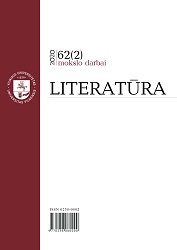Контексты творчества Осипа Мандельштама в диптихе Томаса Венцловы «Два стихотворения о любви»
The Contexts of Osip Mandelstam’s Works in Tomas Venclova’s Diptych “Two Poems about Love”
Author(s): Donata MitaitėSubject(s): Poetry, Comparative Study of Literature, Lithuanian Literature, Russian Literature
Published by: Vilniaus Universiteto Leidykla
Keywords: Venclova; Mandelstam; diptych; poetic image; context;
Summary/Abstract: The article analyzes a diptych “Two Poems about Love” written by Tomas Venclova in 1973 and its contexts. The article refers to the archived manuscript and the translation of Mandelstam’s poem “Za to, chto ia ruki tvoi ne sumel uderzhat‘…” (“For I failed to keep your hands…”) that Venclova first released in 1967. In this case, Mandelstam’s poem is important to Venclova both as a text about a city doomed for collapse, and as a work about love. It is noted that in the diptych this is not the only important poem by Mandelstam (although it was noted in the comments); images from the other poems (“Swallow,” “Leningrad”) were also quoted and reinterpreted by Venclova. Just like Mandelstam, Venclova was also opposed to totalitarianism. For Mandelstam, the post-revolutionary St. Petersburg, and for Venclova the Soviet Vilnius, represent a dying city – in the first poem of the diptych it is moved to the ocean, in such a way highlighting the threatening situation. In the first poem, the source of life is love disguised with a musical theme; the second one already talks about passing lovers – their bodies now “like stones lay next to each other.” Some poetic images are modified in Venclova’s later works. Mandelstam is still as important and will appear next to Ovid, who is only mentioned in the manuscript, in the poem “Tristia” from 1997.
Journal: Literatūra
- Issue Year: 62/2020
- Issue No: 2
- Page Range: 129-137
- Page Count: 9
- Language: Russian

